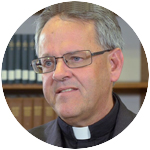
Father Thomas Dailey, O.S.F.S.
In his message for Lent 2019, Pope Francis describes the sacred season as a “path to Easter” that “demands that we renew our faces and hearts as Christians through repentance, conversion and forgiveness, so as to live fully the abundant grace of the paschal mystery.”
Plodding along that path each year makes it look like a never-ending journey. Honest self-reflection identifies the extent of our ever-present faults. Futility frustrates our quest to become better people, let alone the saints we are called to be.
That perception, however, perpetuates a false impression. Saints are not folks with no faults. What makes them holy is their renewable resolve. Some — like St. Francis de Sales (1567-1622) — can teach us how we, too, can profit from our faults.
One of only thirty-six doctors in the history of the Catholic Church, this saint offers timeless teaching to aid us in the pursuit of sanctity. He guides us through the frustration of striving to be good without totally succeeding by proposing a three-step process for spiritual renewal during Lent.
[hotblock]
It begins with the recognition of the uphill struggle we face in life. In truth, he writes, “we must never be astonished at finding ourselves imperfect … because there is no cure for it!” Human finitude limits the personal resolve even of saints, as he tells Saint Jane de Chantal: “I don’t know how I am made. I feel miserable, but I don’t trouble myself about it; and sometimes I am even happy in thinking that I am a really good object for the mercy of God.”
In that joyous self-disclosure, we find a key to making progress. Admitting our inability to be free from faults is good; despairing about it is not. No one likes failure. But our typical responses — either giving up or trying harder — do not change the fact that earthly perfection eludes us.
Hence, the saint repeatedly counsels calmness along the way of conversion: “When we discover that the lute is out of tune, it isn’t necessary to break its strings and throw it out! What we have to do is to lend an attentive ear to discover which is the discordant string, and then tighten or loosen it as required.” And when we show “more compassion for (our heart) than passion against it,” the potential for personal change “will sink far deeper and penetrate more effectively than fretful, angry, stormy repentance.”
Step two entails shifting the balance of power, by focusing not on our own ineptitude but on the eternal power of God. After all, no matter the prevalence of our misdeeds, nothing that we do or fail to do changes who God is. “The foundation of (our) trust,” writes de Sales, “should be in Him not in us. All the more so because we change, and He never does; He always remains good and merciful, whether we are weak and imperfect or whether we are strong and perfect.”
Entrusting ourselves to this beneficent divine power gives us the best chance to advance along the path to holiness. As one of the saint’s spiritual daughters, Sister Mary de Sales Chappuis, would say centuries later, “Each time we offer (Jesus) a fault to be forgiven, we give Him the title of Savior.”
Having handed our efforts over to this saving God, all that remains, as the final step, is to begin again … and again and again! For St. Francis de Sales, renewing our resolutions is not a sign of desperation but of persistence. Starting over despite never seeming to arrive at our goal comes not from being thick-headed but from being faithful and hopeful.
This is our lot in life. This is our seasonal quest — to recognize our faults, trust in God’s grace, and resolve again to follow along that path to Easter.
In this, the saintly doctor encourages us: “Rest is reserved for heaven … (while) on earth we should always fight as though we are between fear and hope. But we must do so, knowing that hope will always be the stronger, bearing in mind the power of the One who comes to our aid.”
Or, as the pope named Francis puts it, “We can thus journey from Easter to Easter towards the fulfillment of the salvation we have already received as a result of Christ’s paschal mystery.”
***
Father Dailey is the John Cardinal Foley Chair of Homiletics and Social Communications at St. Charles Borromeo Seminary, Wynnewood, and a research fellow for the Catholic Leadership Institute in Wayne.



Share this story